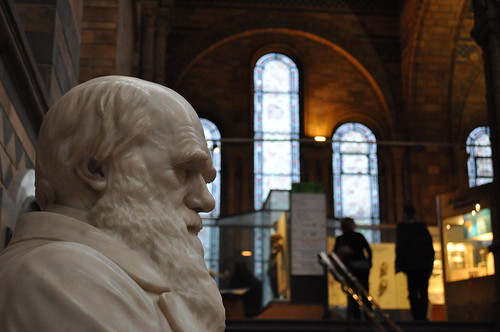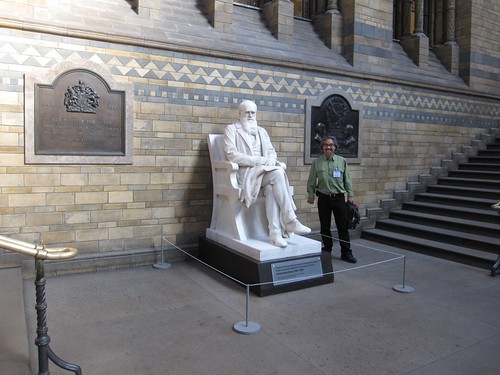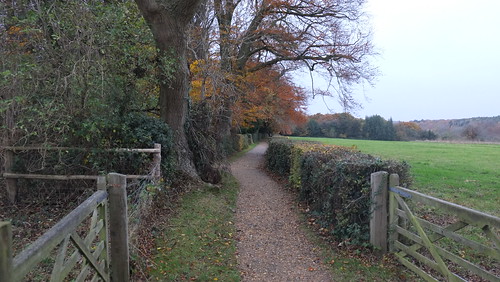One of the enduring myths of creativity is that creative people who treat their families badly do so because the weight of their genius keeps them from being good spouses and parents (99% of the time, husbands and fathers).
This excuse is crap. I was reminded of it recently when reading over Francis Darwin’s autobiographical account of life with his father, the great naturalist Charles Darwin.
As should be clear, Darwin is one of my great heroes. He’s always been an intellectual hero, but the more I know about his life, and the better able I am to appreciate the choices he made, the more I admire him.
Darwin absolutely isolated himself from the world, but never from his family. Down was his effort to create a space that insulated him from the demands of the London scientific scene: after his return from the voyage of the HMS Beagle, and long before the publication of Origin of Species, he had become an important figure in that world. With his publication record, his academic connections (he hadn’t been a brilliant student at Cambridge, but he had studied with some of the best minds of his day), and his family background (his father and grandfather had been distinguished doctors, and he was related to the Wedgewoods of china fortune). He was exactly the sort of person you’d want on one or another committee or panel or conference, and would invite to the monthly meeting of whatever scientific society you were vice-president of.

Royal Astronomical Society, Burlington House, London
Down was close enough to London to let Darwin keep an eye on things andhear the latest news, but far away enough to keep people from bothering him with trivial stuff, and to give him an excuse to avoid serving on examination committees or royal commissions impractical. His son Francis Darwin, who wrote an account of life at Down, said that his father “used to try and stop people coming by representing to them the enormous distance of Down from London, & the labour it would be to come here.”
But Down wasn’t a space for him to isolate himself from his family. Francis has several recollections about his father that illustrate how they ran in and out of his daily life, and don’t seem to have been particularly constrained by the Needs of Genius. For example, Francis describes going on pre-dawn walks:
I used to like as a little boy going out with him, and I suppose I have a vague sense of the red of the winter sunrise, and a recollection of the pleasant companionship and a certain honour & glory. At one time I can remember he used to go on walks still earlier when it was quite dark and I used to be impressed, as a boy, by his telling me that he had once or twice met foxes trotting home at the dawn.
Then there was the Sandwalk.
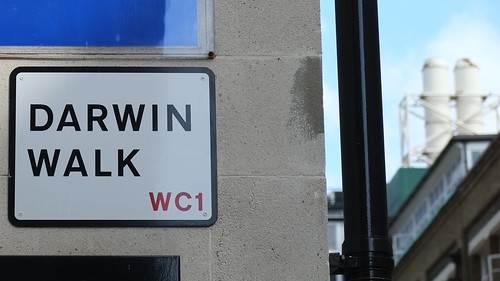
Darwin Walk, University College London
The Sandwalk was a long walk at the back of the property that Darwin called his “thinking path.” Francis recalls:
This was a very pleasant walk, a sheltered shady side; the other side separated from the neighbouring grass field by low quickset hedge over which you could look at what there was — a quiet little valley losing itself in the upland country towards the Westerham hill with hazel coppice and larch wood…. I have heard my father say that it was the charm of this little simple valley which helped in making him take to Down.
This is a space that Darwin had made specifically so he would have a place to walk and think.
He could spend an hour or two out there, exercising his body and letting his mind exercise itself on whatever problem he had been working on earlier that day. As Darwin biographer James Moore put it, Darwin walked as many miles on the Sandwalk as he traveled aboard the HMS Beagle— and it’s hard to say which miles were more important.

For Francis and the rest of the Young Darwins, though, the Sandwalk
was a great place for us to play in as children and we continually saw my father as he walked round and round; he liked to see what we were doing and sympathized in any fun that was going on.
So the kids weren’t fobidden from going on the Sandwalk, nor were they only grudgingly tolerated. In fact, Charles had a handful of flints that he would use to mark how many times he’d gone around the path– he would knock one from one side of the path the other has he passed– and the kids sometimes made a game of moving the flints back, and seeing how many times he would make the circuit before he noticed. (Though any parent will recognize that “not noticing” such shenanigans can be an act.)
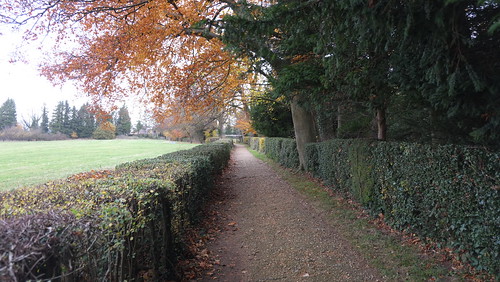
After his post-work turn around the Sandwalk (one of several walks he would take each day), it was time for lunch.
In old days, lunch used to be the children’s dinner and I think dinner for everybody. — I suppose it was rather a ‘hurly burly with all us children as it was described by a relative as violent.
As historian Elizabeth Yale put it, Darwin “conducted his scientific labors in the midst of a rambunctious family life.” Or as my wife and I used to say when the kids were acting up, there’s nothing like a nice quiet evening at home with your children– and this is nothing like it.
Charles also had the habit of having things read to him, usually by his wife Emma or one of his daughters.
He was always rejoiced if he had few letters, & sometimes much worried by a number. He didn’t think much more about them from in the morning. I think, as he would hear any family letters read aloud as he lay on the sofa — I remember him then saying in the semi-indignant voice “Who’s it from?” — I think he was curiously slow in guessing about this sort of thing for I have often heard him ask, when it was evident who it was from….
I think the paper was the only non-scientific matter which he ever read to himself — everything else novels, travels, history were read to him…. The fact that for so many years he had reading aloud several time a day, each reading being at least 1/2 hr, enabled him to get through a great deal of lighter literature….
When letters were finished he went up to his bedroom to rest — lying on the sofa and smoking a cigarette; and listening to a novel or other book not scientific.
So the picture that emerges from family accounts of the Darwin household is one in which Charles isn’t a distant Victorian father-figure, or unapproachable, or someone whose ambition and focused required that children be seen at not heard, if that. Instead, he’s an active part of their lives, and they’re an active part of his.
It’s an account that provides a sobering corrective to the idea that parenting and genius are mutually exclusive, or that being obsessed with your work either renders you unable to be a good parent, or worse yet gives you license to be a negligent parent. If your work is more profound and history-changing than Darwin’s, you might get a pass. If not, shut up.
